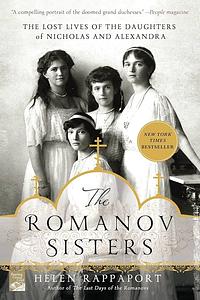You need to sign in or sign up before continuing.
Take a photo of a barcode or cover
I enjoyed this read, but I would have liked there to be more cultural/political context. I understand Rappaport's choice in focusing consistently on what she could learn of the family itself, their relationships and their activities during their short lives. But it actually felt disjointed because if you don't have a deeper explanation of what the populace was complaining about the story ends up lopsided and very sympathetic to the Tsar's obliviousness. I think providing a richer understanding of the country under his rule would not have taken away from caring about his daughters and the family's tragic end.
emotional
informative
reflective
sad
medium-paced
I listened to this one via Audible. The narration was great, if a bit relaxing to listen to. Very soothing voice. I’d have loved a bit more of the context of Russian politics, specifically toward the end of the book, but the story was engaging and full of first hand accounts, which I really enjoyed. If you’re interested in the story of this rather unique family, this is a good place to get your feet wet.
emotional
informative
sad
This was a very interesting and captivating read. Rappaport’s research of the Romanov family is extensive. She opens with the telling of the early days of the courtship of Princess Alix of Hesse (daughter of Princess Alice and granddaughter of Queen Victoria) and her third cousin, Nicholas (Nicky) Alexandrovich, heir to the Russian throne. After their marriage, the couple, as well as the Russian people are looking forward to the birth of a successor to Nicholas but are met with the arrival of a succession of daughters, Olga, Tatiana, Maria, and Alexandra. When their son, Alexei finally arrives, their joy is short-lived as they come to realize that he has inherited hemophilia, a dreaded bleeding disorder through his mother’s bloodline. The introduction of Rasputin to the royal couple seems an answer to their prayers, as Alexei recovers from bruising time after time under his watch. As the pages are turned, we read of the maturing of the Romanov children and learn a bit about their personality, interests, and shortcomings. The ending of this aligns with the killing of the Russian Imperial Romanov family on the seventeenth of July in 1918. Fate dealt a cruel blow to this clan, and I couldn’t help but wonder how different it could have been for them had Alexei been born healthy and before his sisters, or Alix been a healthier woman and been more present in Russian society, or Nicholas been a stronger leader, or had the world not been at war from 1914 through 1918.
informative
inspiring
slow-paced
This is a great comprehensive view of what the Romanovs' personal lives were like. However, I should note that while the revolution is obviously an important part of the story, this is from the Romanovs' viewpoint. It's mainly about their mother and the girls.
A compelling and haunting portrait of the Romanov family focused on the four Grand Duchesses. Having first learned about the murder of the Romanov family many years ago via various documentaries (often with focus on the supposed "escape" of Anastasia) it was a very fascinating look into the lives and personalities of these distinctive young women who met such a brutal end.
The combination of quotes picked up from various sources along with the narrative is a very engrossing read. Highly recommend for anyone interested in Imperial Russia and a new angle to consider this chapter of history from.
The combination of quotes picked up from various sources along with the narrative is a very engrossing read. Highly recommend for anyone interested in Imperial Russia and a new angle to consider this chapter of history from.
An excellent highly readable history of the last czar told through the lens of the Romanov daughters. It turns out (not surprisingly) that I did not know very much about the fall of Russian Imperial rule, and it is a fascinating story, in part because Nicholas and Alexandra turn out to be not fascinating at all. Alexandra is a whiny, humorless, hypochondriac with social anxiety, and Nicholas a good dad who mostly wants to be left alone. Fresh, educational and interesting all in one, I highly recommend the read.
One note, the narrator of the audiobook was a little irritating to me. Overall her reading was good, but she is very dramatic, and really pounds on "proper" pronunciation for non-English words. That would be okay, but she pronounces everything not in English with her version of a Russian accent...including Chinese and French words. It worked my last nerve. Also, when reciting correspondence in what I think was supposed to be a mournful voice, she does this moaning hoarse voice which sounds like she just had a really delicious orgasm. No insult to orgasms or to the vocal effects of same, but the word "hemophilia" should never sound like pillow talk.
One note, the narrator of the audiobook was a little irritating to me. Overall her reading was good, but she is very dramatic, and really pounds on "proper" pronunciation for non-English words. That would be okay, but she pronounces everything not in English with her version of a Russian accent...including Chinese and French words. It worked my last nerve. Also, when reciting correspondence in what I think was supposed to be a mournful voice, she does this moaning hoarse voice which sounds like she just had a really delicious orgasm. No insult to orgasms or to the vocal effects of same, but the word "hemophilia" should never sound like pillow talk.




